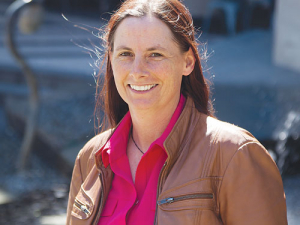The newly-elected president of Federated Farmers has a key goal to connect with urban people and bridge the gap between town and country.
Katie Milne, a West Coast dairy farmer and the first woman to head a farmer’s organisation in NZ, says she was elected because of her ability to connect with people.
Her skills are in people and engagement; that’s the message she has been getting from friends and colleagues within and outside farming.
“They say I have a way of putting things to people who know nothing about farming so that they actually get it and understand it,” Milne told Rural News.
“The reason I got into the federation in the first place was because... people were taking control away from me as a young farmer who’d just bought a farm.
“The Resource Management Act (RMA) had come in and I managed to understand what that meant for our farm. I got involved to make sure there was a voice for farmers, which is exactly what Federated Farmers is all about so it was a natural fit.”
Milne wants to show urban people that farmers are not a threat to the environment as is commonly believed. She says many positive things are happening in the farming sector and she wants this showcased at all levels and in all sorts of ways.
“I tweet pictures of the trout and fantails on my farm all the time to show people we can be trusted and we are living with their environment and enjoying nature and we love it so why should we be detrimental to it.
“I have been in the social media vein of doing things because I think it is the way to connect with people – especially young people. Rural people and young farmers are all over social media so why shouldn’t we be there too?”
Milne says farmers feel under threat, especially in election year when the anti-farming lobby is out there trying to score points on farmers who they see as an easy target. She wants to change this.
As part of this new connection, Milne wants to re-define people’s perception of agriculture and remind them that the food they consume is produced by farmers.
She was in a restaurant and asked the waiter and chef what they thought farmers did.
“The answer was very intriguing: working with the land and working hard in bad weather. Neither had worked out that [our purpose] is growing high quality food for them to turn into magnificent meals.”
Who’s running Feds?
Manawatu dairy farmer Andrew Hoggard is now national vice-president, while South Canterbury farmer Miles Anderson takes the national meat and fibre chair and Rick Powdrell steps aside.
Waikato farmer Chris Lewis takes over as national dairy industry chair, and North Canterbury farmer Lynda Murchison is one of two board members-at-large alongside Chris Allen who was reappointed.
The meat and fibre group is now headed by Miles Anderson plus William Beetham,Wairarapa; Dan Hodgen, North Canterbury; Simon Williamson, High Country; Simon Mcatamaney, Otago; and Dave Wilson, Northland.
The dairy group is headed by Chris Lewis, Waikato; Wayne Langford, vice-chair, Golden Bay; Jacqui Hahn, vice-chair, Waikato; Renee Rooney, West Coast; Stephen Crawford, Otago; and Richard McIntyre, Manawatu-Rangitikei.











